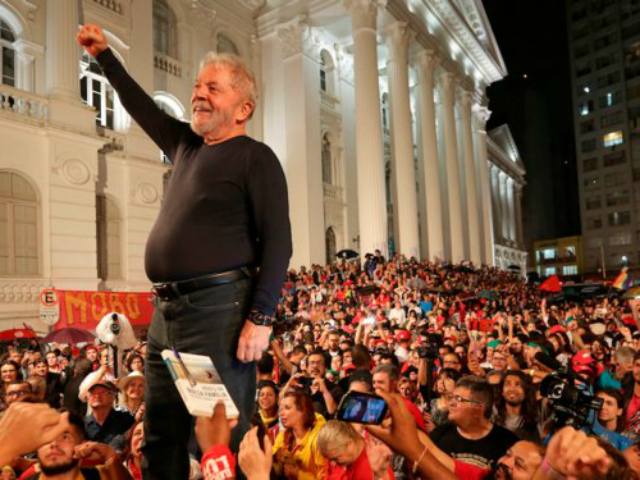An appellate judge in Brazil scrambled Sunday to overturn a surprise decision by a lower-level weekend duty judge to free former president Luiz Inácio Lula da Silva, a socialist serving a 12-year prison sentence for spearheading a million-dollar corruption scheme.
Lula, as he is commonly known, was initially sentenced to almost ten years in prison, but appealed the case. On appeal, the court extended his sentence to 12 years, citing the gravity of his crimes.
Weekend Judge Rogerio Favreto accepted a habeas corpus petition from Lula’s Workers’ Party (PT), which hopes to run Lula as a presidential candidate again in October’s election, that argued Lula should not be serving his prison sentence while the elections are ongoing because he wants to participate. Favreto made his move while the federal judge who ruled to send Lula to prison, Sergio Moro, was on vacation.
Moro responded swiftly despite being on vacation, issuing a statement reading in part, “With all due respect, [Mr Favreto] has absolutely no qualified authority to override the decision.” Moro ordered police not to free Lula without a decision from a higher judicial authority. Favreto responded by publicly stating that police should free Lula within the hour, triggering the appearance of over one thousand socialists in support of Lula before the prison.
Shortly after the hour passed, however, appellate Judge Joao Pedro Gerbran Neto overruled Favreto. Lula remains in prison, and there is no evidence that any legal action will allow his release in the near future.
The incident has left many in Brazil confused, not the least those in the judiciary. To prevent a repeat occurrence, the nation’s attorney general moved to issue a clear directive that Lula cannot be released unless the nation’s highest court, the Supreme Federal Tribunal (STF), approves his release. Experts speaking to the Brazilian newspaper O Globo lamented that the fray following Favreto’s decision “shows the fragility of the Brazilian judicial system,” where any judge can decide at a given time to take a contrary stance to that of the rest of the judiciary and cause mass confusion.
Several observers told the newspaper that Favreto’s decision to accept the habeas corpus petition was unusual because the PT did not present any new evidence. The argument the party made to the court was that Lula wished to run for president of Brazil and that being in prison would hinder his ability to campaign. Yet Lula began his prison sentence in April and announced his candidacy for president in July 2017, a full year ago. The presidential election – unlike the appearance of a new witness or revelation of yet undisclosed fact – was not enough to relitigate his imprisonment, opponents of the measure argued.
Others noted that whether Lula wanted to appear on the presidential ballot or not was no longer up to him, as a politician twice convicted of corruption. Under Brazil’s Clean Slate Law, all politicians must have a “clean slate” on corruption crime to get on the ballot. Candidates convicted of corruption crimes cannot stand for public office. Even if he receives a habeas corpus temporary release, that would not undo the conviction.
In the immediate aftermath of Favreto’s decision, Brazilian news outlets began to question why he had accepted the PT petition. Several journalists noted that Favreto, appointed as judge by Lula’s successor Dilma Rousseff, had extensive ties to the PT himself. According to the Estado de Minas newspaper, Favreto had been affiliated with the PT for nearly twenty years until taking the judicial bench.
Lula’s imprisonment was a point of major contention in April, as most national polls showed him the frontrunner in October’s elections despite his conviction. In a dramatic primetime audience, the STF issued a divided ruling to reject habeas corpus petitions seeking to prevent the government from forcing Lula to begin serving his sentence. The PT insisted throughout the process that it had no “plan B” for the presidential election and to this day has not nominated a candidate to replace Lula on the ballot, instead repeatedly filing habeas corpus petitions to the nation’s appellate court.
Lula was convicted of taking over one million dollars in bribes as part of “Operation Car Wash,” in which the federal government allowed contractors to overcharge on government infrastructure projects so long as they “kicked back” part of the excess cash. Sergio Moro’s court found that Lula used his illicit funds to purchase a luxury beachfront property, serving as concrete evidence of the corrupt money. Politicians from all across the political spectrum have landed behind bars thanks to allegedly spending “Operation Car Wash” funds on private luxuries.

COMMENTS
Please let us know if you're having issues with commenting.